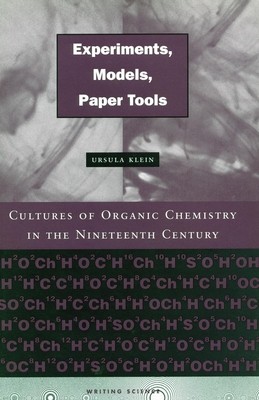
- We will send in 10–14 business days.
- Author: Ursula Klein
- Publisher: Stanford University Press
- ISBN-10: 0804743592
- ISBN-13: 9780804743594
- Format: 16 x 24.4 x 2.6 cm, hardcover
- Language: English
- SAVE -10% with code: EXTRA
Reviews
Description
In the early nineteenth century, chemistry emerged in Europe as a truly experimental discipline. What set this process in motion, and how did it evolve? Experimentalization in chemistry was driven by a seemingly innocuous tool: the sign system of chemical formulas invented by the Swedish chemist Jacob Berzelius. By tracing the history of this "paper tool," the author reveals how chemistry quickly lost its orientation to natural history and became a major productive force in industrial society.
These formulas were not merely a convenient shorthand, but productive tools for creating order amid the chaos of early nineteenth-century organic chemistry. With these formulas, chemists could create a multifaceted world on paper, which they then correlated with experiments and the traces produced in test tubes and flasks.
The author's semiotic approach to the formulas allows her to show in detail how their particular semantic and representational qualities made them especially useful as paper tools for productive application.
EXTRA 10 % discount with code: EXTRA
The promotion ends in 19d.20:47:28
The discount code is valid when purchasing from 10 €. Discounts do not stack.
- Author: Ursula Klein
- Publisher: Stanford University Press
- ISBN-10: 0804743592
- ISBN-13: 9780804743594
- Format: 16 x 24.4 x 2.6 cm, hardcover
- Language: English English
In the early nineteenth century, chemistry emerged in Europe as a truly experimental discipline. What set this process in motion, and how did it evolve? Experimentalization in chemistry was driven by a seemingly innocuous tool: the sign system of chemical formulas invented by the Swedish chemist Jacob Berzelius. By tracing the history of this "paper tool," the author reveals how chemistry quickly lost its orientation to natural history and became a major productive force in industrial society.
These formulas were not merely a convenient shorthand, but productive tools for creating order amid the chaos of early nineteenth-century organic chemistry. With these formulas, chemists could create a multifaceted world on paper, which they then correlated with experiments and the traces produced in test tubes and flasks.
The author's semiotic approach to the formulas allows her to show in detail how their particular semantic and representational qualities made them especially useful as paper tools for productive application.


Reviews